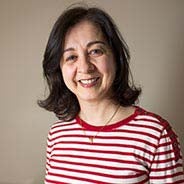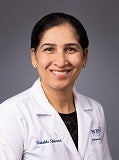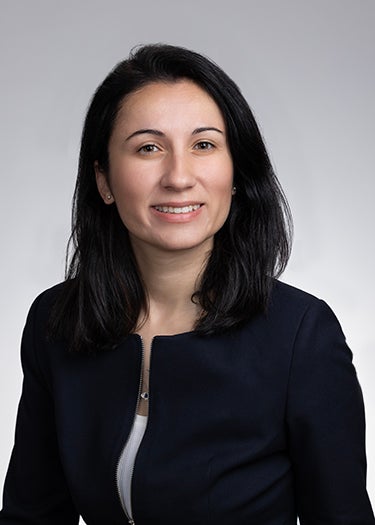Fellows in Pediatric Infectious Diseases participate in a 3-year program that provides training to prepare them for successful careers in Pediatric Infectious Diseases and to assure their qualification for the American Board of Pediatrics certifying examination in Pediatric Infectious Diseases. The three-year training experience includes submersion in the clinical experience in the first year followed by two years of concentrated mentored research time.
- Mission Statement
- Program Aims
- Fellowship Training Program Summary by Year
- Salaries and Benefits
- Fellowship Program Contact Information
- Current Fellows
- How to Apply
- Letter from the Program Director
Mission Statement
Our fellowship program is dedicated to providing high quality, comprehensive, culturally relevant health care as an academic teaching hospital. BMC pursues this mission through sponsorship of graduate medical education programs. It is the primary goal of graduate medical education at BMC to educate and prepare physicians for board eligibility in a variety of medical disciplines through curricula which reflect an appropriate balance of patient care, education, and research
Program Aims
To provide organized and academically rigorous programs of education which foster physicians’ professional development as skilled, ethical, and compassionate clinicians, sensitive and capable of meeting the challenges of a changing healthcare environment and assuring high-quality patient care. To promote research and scholarly activities relevant to the medical care of our patients and the educational needs of our trainees. To promote the development of a system of graduate medical education and patient care which may include collaboration with other institutions and affiliated community health centers.
Fellowship Training Program Summary by Year
Fellows assume gradually increasing levels of responsibility as they gain clinical expertise in infectious diseases. This may involve a large degree of decision-making, increased supervisory responsibilities, or increasing opportunities to give talks or present research results.
First Year of Fellowship
The primary goals of the first year of fellowship are to focus on increasing breadth of knowledge in the field of infectious diseases, and to begin the process of assuming leadership of a team by starting to teach residents and medical students under the supervision of the attending physician. The fellow will see and discuss each patient on the service, whether or not they have also been seen by a resident or student, before rounding with the attending, and will review the written notes on all patients. In the first year of fellowship will complete 6-7 months of clinical training, plus 2 weeks of microbiology. The fellow will complete 1 half- day session per week of International Clinic (40-45 weeks per year). The Fellow with have 3 months of Research training experience by the end of the first year of fellowship. The fellow will have four week vacation.
Second Year of Fellowship
The primary goals of the second year of fellowship are to focus on solidifying knowledge in the field of infectious diseases and assume greater leadership of the consult team by increasing the amount of teaching of residents and medical students. The fellow will continue to see and discuss each patient on the service, whether or not they have also been seen by a resident or student, before rounding with the attending, and will review the written notes on all patients. In the second year of fellowship, the fellow will complete 3-4 months of clinical training, with increasing responsibility for patient management and supervision of residents and students. The fellow will complete 1 half- day session per week of Infectious Disease Clinic (38-40 weeks per year) with increasing responsibility of patient management. The Fellow with have 7 months of Research training experience by the end of the second year of fellowship. In the second year the Fellow will have the opportunity to attend a national meeting if presenting work. The fellow will have four week vacation.
Third Year of Fellowship
The primary goals of the third year of fellowship are to focus on increasing and solidifying knowledge in the field of infectious diseases; to assume the major portion of the teaching of the residents and medical students on the consult service as well as the participation in teaching and discussion of cases in clinical situations; and to identify any gaps in knowledge in the field of pediatric infectious diseases and work with the faculty to identify ways to fill these gaps. The fellow will continue to see and discuss each patient on the service, whether or not they have also been seen by a resident or student, before rounding with the attending, and will review the written notes on all patients. In the third year of fellowship, the fellow will complete 3- 4 months of clinical training, plus a TB clinic rotation with increasing responsibility for patient management and supervision of residents and students. The fellow will complete 1 half- day session per week of either International Clinic or Infectious Disease Clinic (38-40 weeks per year) with increasing responsibility of patient management. The Fellow with have 7 months of Research during the final year of fellowship. The Fellow will have the opportunity to attend a national meeting if presenting work.
Educational/Conference Curriculum
- Microbiology Rounds – Weekly
- Pediatric Infectious Diseases Conferences – weekly
- Laboratory or research meetings – weekly
- Core Conferences – weekly
- HIV conferences – approximately weekly
- Combined Pediatric and Adult ID conferences – weekly
- Pediatric Grand Rounds – weekly (not held during summer months)
- Pediatric Case of the Week - weekly
Salaries and Benefits
Salaries for fellows are as below. This may be subject to change.
First Year Fellows: $75,948.35
Second Year Fellows: $79,891.35
Third Year Fellows: $84,516.84
Benefits include four weeks of vacation, health insurance, disability insurance and full malpractice coverage. BMC Intern, Resident and Fellow Benefits
Fellowship Program Contact Information

Marisol Figueira, MD
Program Director
Pediatric Infectious Diseases Fellowship
Email: Marisol.Figueria@bmc.org
Phone: 617-414-4328

Vishakha Sabharwal, MD
Associate Program Director
Pediatric Infectious Diseases Fellowship
Email: Vishakha.Sabharwal@bc.org
Phone: 617-414-5814
Heather Griffin
Senior GME Program Administrator
Pediatric Infectious Diseases Fellowship
Boston Medical Center
670 Albany Street, Room 637
Boston, MA 02118
T: 617-414-5591
Email: Heather.Griffin@bmc.org
Current Fellows:

Mine Duzgol, MD (Second Year Fellow)
Past Training:
Medical School: Ankara Üniversitesi Tip Fakültesi Medical School
Residency: Pediatrics at Kocaeli University in Kocaeli, Turkey
Fellowship: Pediatric Infectious Diseases at Dr. Behcet Uz Children's Hospital in Izmir, Turkey (2021)

Ilan Rozen, MD (First Year Fellow)
Medical School: Universidad Anáhuac Escuela de Medicina
Residency: Pediatrics - Sheba Medical Center, Tel Aviv University, Israel

Sergio Lerma, MD (Starting First Year in January 2023)
Medical School: Universidad Nacional de Colombia Facultad de Medicina
Residency: Neonatology-Perinatology University of Texas Medical Branch, Galveston, TX and Neonatology at Universidad del Rosario, Bogota, Columbia
Recent Pediatric Infectious Diseases Program Graduates:
Sacha Al-Hassan, MD (2022) - Current Pediatric resident in the Boston Combined Residency Program (BCRP)
Lukman Abdurrahim, MD (2021) - General Pediatricians at Lowell Community Health Center
Amy Triche, DO (2021) - Director of infection control at Fair Haven Community Health Center, CT
Ingrid Camelo, MD (2020) - Attending Physician/Faculty at Medical College of Georgia
Rotem Lapidot, MD (2019) – Post Doctoral Fellow, Boston Medical Center, Boston, MA
Rachel Epstein, MD (2018) – Attending Physician, Pediatric and Adult Infectious Diseases, Boston Medical Center, Boston, MA
Sabine Schnyder, MD (2016) – Director, Clinical Development & Infectious Diseases at Moderna
Inci Yildirim, MD (2015) – Attending Physician, Yale School of Medicine
How to Apply
Thank you for your interest in the Pediatric Infectious Diseases Fellowship Program. To be considered, applicants will generally have completed three years of training in an accredited pediatric residency program by the time the fellowship begins. Fellows come from a wide variety of training programs throughout the country with a diverse range of interests. Our fellowship is designed to train physicians interested in pursuing an academic career in pediatric infectious diseases.
The Pediatric Infectious Diseases Fellowship Program accepts all applications through the Electronic Residency Application Service (ERAS), and participates in the National Residency Matching Program (NRMP). Interviews occur between August and November, with the match occurring in December. All interviews will be conducted virtually in 2022 and to be determined in 2023.
Interviews will be conducted from August to October, with match day being in November.
The following documents are required:
- 2 Letters of Recommendation from members of your faculty (please address letters to Program Director)
- 1 Letter of Recommendation from your residency program director
- Personal Statement
- Curriculum Vitae
- Official Medical School Transcript
- Official USMLE Transcript
- Official ECFMG Transcripts, if applicable
After applications have been screened, selected fellowship candidates will be invited for a virtual interview with faculty and fellows.
Letter from Program Director
Dear Prospective Fellowship Applicant,
Thank you for your interest in pediatric infectious diseases, an incredibly diverse and rewarding specialty. As evidenced by the ongoing COVID-19 pandemic, pediatric infectious diseases physicians have never been more important nor their duties more diverse. This pandemic has highlighted the wide array of career paths available to a pediatric infectious diseases’ specialist; everything from clinical care, disaster planning, infection prevention and control, antimicrobial and diagnostic stewardship, immunology, microbial pathogenesis, vaccine development, epidemiology and public health, public relations, and social determinants of health. We need you to join this exciting profession and we are committed to helping you find your particular niche within it.
The Pediatric Infectious Diseases Society (PIDS), the PIDS Training Programs Committee, and pediatric infectious diseases program directors understand that the 2020-2021 fellowship application season falls during a complex time. We also understand that some anticipated infectious diseases clinical and research elective rotations may not have been pursued, anticipated research projects may not be completed, and previously envisioned letters of recommendation may not materialize. We assure you that we will be mindful of these realities when reviewing applications.
Therefore, we strongly encourage anyone who is considering applying for pediatric infectious diseases fellowship to apply during this application cycle. In order to ensure that the recruitment process is fair, equitable, and socially responsible, all pediatric infectious diseases fellowship interviews for the 2022-2023 academic year will only be offered virtually.
We look forward to meeting you and getting to know your interests within our rewarding and ever-changing subspecialty!
Regards,
Pediatric Infectious Diseases Fellowship Program Director
